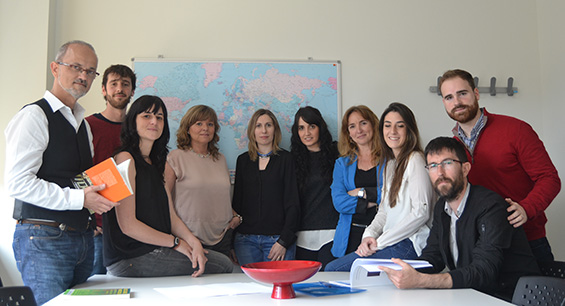
If somebody asked us what a “community policing” model was, we would not probably know how to answer them. However, it is a model that they have been implementing for over 10 years in the London Metropolitan Police Service with very good results and Bilbao is now studying its implementation in various districts.
“Community policing consists of a single police officer patrolling a specific neighbourhood on foot”, explains Cesar San Juan Guillén, from the Social Psychology Department of UPV/EHU, “and it is a paradigm shift from what we are familiar with.” This type of officer’s work consists of getting to know their neighbourhood and being known by its inhabitants. This individual needs to inspire confidence and have a set of negotiation and conflict management skills. These skills are used to prevent crimes and resolve the types of community conflicts that cause most incidents.
“Implementing a model like this takes years, because you have to review the policies for hiring new officers”, explained César. “It is not just about putting police officers on the street. A community police officer needs to have a set of interpersonal skills, and even language skills which were not required of traditional police officers in the past. ”The figure of the “action man or woman” is losing prominence. The London Metropolitan Police Service, which already has experience in this area, has community officers from practically all ethnic backgrounds who are important figures in their communities, with the language skills necessary to interact with them.
Moving towards this new model of policing requires a change of mentality, a lot of training and changes in the recruitment criteria for new personnel. In César’s research group, they have developed the principles of this new model, identifying the relevant indicators to measure its progress and they have offered all of that advice to the Bilbao Municipal Police Force, which is very interested in this new model.
This way of organising policing activity offers considerable advantages in terms of obtaining information and crime prevention. The role of the police offer becomes more proactive than reactive and, as a result, improvements in the perception of security of citizens can be expected. “Curiously, there is no direct correlation between the perception of security and crime indicators”, remarked César, who has been studying the matter for some time. “For example, Spain has one of the lowest crime rates in Europe but one of the worst perceptions of security in the entire European Union. We are very pessimistic in this regard.”

César and his team, the Applied Criminology Research Group, have been working on various lines of research relating to crime prevention for a number of years. They have a first line of research related to youth crime and they assess the Basque Government’s youth justice plan each year. Furthermore, they also work in a field called environmental criminology, which studies the impact that an environment has on the crimes that are committed. In this research, they try to identify the characteristics of public spaces that increase or decrease the likelihood of crimes being committed there.
When we asked César how he benefits from participating in knowledge transfer activities with institutions and media outlets through the Euskoiker Foundation, he replied: “It gives my work meaning. This is «real» research, which has an effect on society. It gives me far more satisfaction than being published in a scientific journal, which I know that only a few criminologists will read.”
In this regard, he also noted that “for our research group, working together with the media is a crucial part of our activity. I know that if I do not go to a television programme to talk about a subject that is troubling society, it will probably be someone else who does not have the necessary expertise.” So Cesar believes that university lecturers should make the effort that is sometimes required to collaborate with the media on subjects relating to their speciality. “It is not easy because the format of the media and its time constraints mean that sometimes you make statements that would require further qualification, but I believe that it is necessary."
Do you need an expert? Contact us
What is the benefit of contracting projects with companies?
¿Cómo puedo contratar proyectos con la Universidad?
Euskoiker has more than 30 years of experience managing all kinds of projects